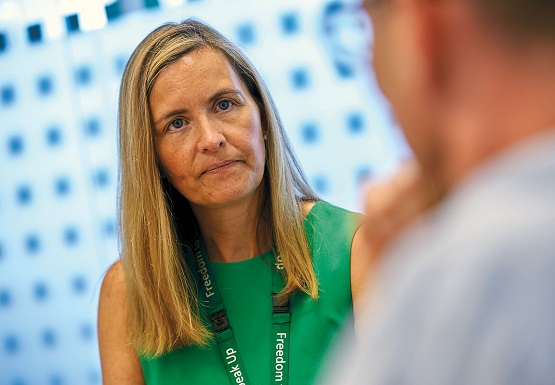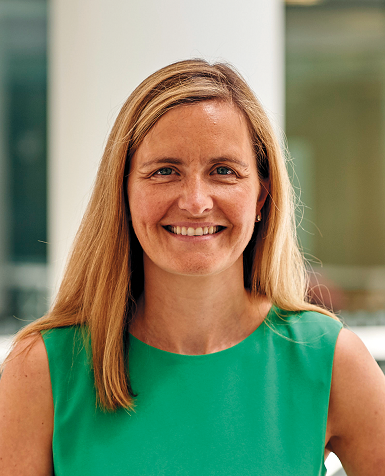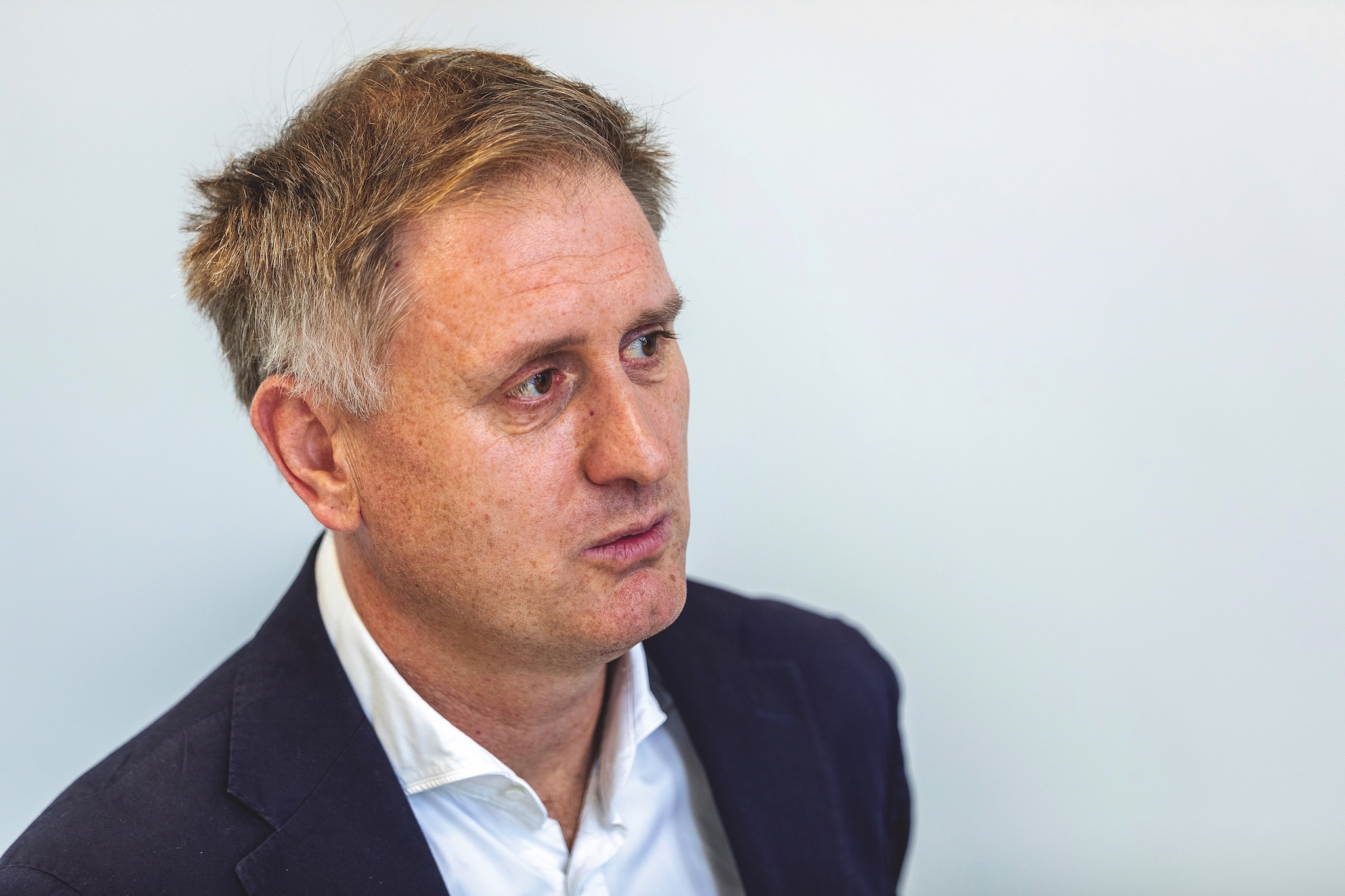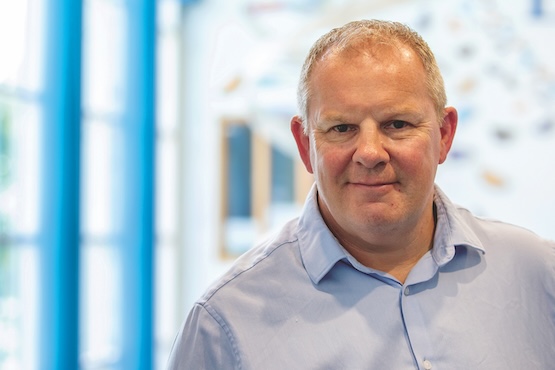Interview: Henrietta Hughes, NHS National Guardian

NHS guardians have a tricky but powerful role in tackling poor care and boosting staff engagement. National Guardian Henrietta Hughes speaks to Healthcare Manager.
Too often, says Henrietta Hughes, “the policies of the past have not fostered a culture where people feel safe to speak up”. And those policies had a price – one paid by the patients, carers and staff caught up in the care scandals that periodically hit NHS organisations.
When NHS workers’ warnings about poor care, unsafe practices or bad management are not heard and acted on, says Hughes, “we see the consequences. Look at Gosport: when staff haven’t been able to speak up, haven’t been listened to, when the right actions haven’t been taken. It doesn’t produce good news stories for those organisations.”
For years, patients’ families and staff warned of the excessive opiate use at Gosport War Memorial Hospital – blamed for the early deaths of up to 650 people – “and the evidence is that if they’d been listened to back in the 1990s, we wouldn’t have this massive scandal now. If people say: ‘We want to learn, to fix things, to nip them in the bud,’ then problems don’t become intractable.”
Safe channels
Hence the appointment – following a recommendation in Sir Robert Francis’s 2015 report – of ‘Freedom to Speak Up’ guardians within NHS bodies. These, says NHS Improvement, should provide a safe channel through which staff can raise concerns; guardians then monitor the organisation’s response, feed back to staff, and see that appropriate changes are made to systems and policies.
This is clearly a tricky job – one that could leave guardians caught between legitimate staff concerns and resistant organisational cultures. So who guards the guardians? That’s Dr Hughes: a practicing GP and former NHS England medical director, two years ago she was made the National Guardian for the NHS – charged with overseeing the appointment and management of local guardians, providing them with training and support, and protecting guardians and staff raising concerns from negative repercussions.
Why did she take the role? “I’ve worked in general practice, in hospitals and in the community, and there were lots of times when I’ve spoken up and been listened to,” she replies – but there were also, she adds, plenty of occasions when her concerns fell on deaf ears. As a medical director, she recalls, “I spent a lot of time looking at the reports after serious incidents, and it was clear that people were often aware of things that could have been done differently, but weren’t – leading to harm.”
So when the job came up, she saw an opportunity to “put things right before people get harmed”. And over the last two years, she’s found ever more evidence that an organisation’s willingness to seek out, listen to and act on staff concerns is closely linked to the quality of its care.
Valuing feedback
When Hughes’ National Guardian’s Office (NGO) surveyed all the guardians last year, none of those working in NHS bodies with ‘outstanding’ CQC ratings said there were significant barriers to speaking up in their organisation; but only 45% of those in bodies rated ‘inadequate’ could say the same. And in outstanding trusts, 77% said that managers support staff to speak up; the figure for inadequate trusts was 18%. The NGO’s data also shows that more people raise concerns with guardians in high-performing organisations than in failing ones: far from suggesting a dysfunctional organisation, high guardian caseloads signal a healthy working culture. “The key is to value that feedback, and to see it as a way of helping to make improvements,” Hughes explains.
The guardians aren’t intended, she says, to usurp line managers’ roles as the first port of call for staff concerns: instead, they’re an “additional conduit” for people who aren’t comfortable raising particular issues with their manager – and those who’ve done so, but to no avail. She hopes that the appointment of guardians will, by protecting concerned staff and ensuring their warnings are taken seriously, reduce the number of people raising the alarm publicly or having their careers blighted. “It’s only when organisations respond inappropriately [to concerns] and victimise people that it becomes a whistleblowing situation,” she says.
The NGO does not define whether guardians should be full or part-time, where they should sit within the organisation, how they should feed concerns into the system, or what their backgrounds should be: stressing that the role is open to managers, Hughes says, “we’ve got nurses, doctors, therapists, chaplains, facilities managers, board secretaries – people from a whole range of professions”.
Hughes’ office does, however, take a keen interest in how guardians are appointed. A “tap on the shoulder” isn’t appropriate, she says: “We really welcome organisations that have advertised and been through a full appointment process, or elected a guardian, or had a staff governor chosen by their colleagues.” Guardians need ready access to the chief executive and the board of directors, Hughes continues; they should “be able to ask the right questions of the board, and to challenge them on actions that are underway”.
Unions are key
Guardians also need enough time to do the job, which involves being “visible to all staff members”, Hughes explains. “We expect them to work with all the other parts of the organisation, such as staff side, complaints, incidents and the risk department, so they can identify where the hotspots are.” The unions have an “absolutely key” role to play, she adds. “If managers have raised concerns with their union, and the union is getting stuck, they may well find that working with the guardian can unstick that. We really would welcome partnership working between Managers in Partnership and the Freedom to Speak Up guardians.”
To ensure that NHS bodies are managing the system well, Hughes explains, guardians are interviewed by the CQC on “how well this has been implemented, whether they have sufficient time for the job, and whether issues that they escalate are being acted upon” – with results feeding into the ‘well-led’ element of CQC ratings. That should “make organisations take note of this, and act on it seriously,” she comments.
 “The key is to value feedback, and to see it as a way of helping to make improvements”
“The key is to value feedback, and to see it as a way of helping to make improvements”
She explains that guardians use their discretion in deciding how to handle issues – from having a quiet word with a colleague of the complainant, to requesting a full-blown independent investigation. And she emphasises that their casework ranges from clinical care issues through to strategic matters such as change programmes, “bridging patient safety and organisational development in a way that I’ve never seen before”.
Strategic decisions
Crucially, Hughes says, guardians often examine the underlying dynamics behind problems rather than plugging the immediate gap; she cites one case in which a shortage of nurses on a ward led to a full review of recruitment practices. “This is really dramatic in terms of fixing the root cause, rather than trying to patch things up as we go along,” she says. “Maybe what’s happening with guardians is not what was anticipated.” Their introduction might, in other words, prove to be a more fundamental reform than even Sir Robert Francis had envisaged.
The prospect of guardians intervening in strategic decision-making may concern some managers. But Hughes urges NHS leaders to welcome their input, which is borne of the frontline workers’ hands-on expertise: this isn’t about “pointing the finger of blame”, she says, but building a “common enterprise where we’re trying to do things better”.
She stresses too that guardians are there for managers as well as more junior staff: “If you as a manager feel that you’re not able to escalate an issue, talk to your guardian,” she says. And Hughes adds that the system may improve the handling of staff complaints against line managers. Unlike complainants who call the whistleblowing helpline, she explains, those who approach a guardian are drawn into a detailed conversation: “The guardian is able to find out what has gone before: have there been other factors which might suggest that people are not raising concerns for the right reasons?”
For the system to work, it’s essential that both managers and more junior staff who approach guardians are confident that they’ll be protected. All are offered confidentiality, and guardians provide ongoing support to those raising concerns. NHS Improvement’s policy states that “if somebody is victimised after speaking up, the person who victimises them should be subject to the full disciplinary process”, she says. “I’m looking to see that actions are taken; that people are using that policy.”
As yet, it’s not clear that they are: Hughes’s information suggests that about 5% of those raising concerns – about 300 people – fear they’ve suffered detriment, but only one trust has told her they’ve disciplined somebody for victimising a complainant.
The guardians themselves, of course, also need protecting – and here, the picture is clearer. Hughes conducts exit interviews with guardians leaving the role, and says no one has told her they’re quitting because they’ve “had a bad experience”. Her office organises regional networks where guardians can support one another, and provides direct support when “guardians have felt quite vulnerable in their role as the messenger” carrying bad news. She regularly publishes case reviews examining NHS bodies’ handling of guardians’ management and casework: these are bluntly-written and would, she suggests, provide a way to call out any trust failing to protect its guardian.
Expanding coverage
Looking to the future, Hughes says the programme is rolling out into primary care; her office is working out how to expand coverage to the sector’s 50,000 organisations. Meanwhile, the arm’s length bodies – including NHS England, NHS Improvement and the NGO’s host organisation, the CQC – “have all appointed guardians, because they recognise their own speaking up cultures aren’t right”. And social care? “I’ve certainly had people coming to me saying that they’d like to have them in social care,” she replies. “That’s well outside my area.” In the newly renamed Department for Health and Social Care, though, it may not remain outside her area indefinitely.
Henrietta Hughes seems a gentle, caring person; even in an interview, her GP’s bedside manner comes through. How can people be confident that she’ll be robust in their defence? “When it comes to protecting my patients, I’ve always been very robust about ensuring they get the care they need. And in this role I’m more than happy to challenge the system – whether that means trusts, regulators or government departments,” she replies. In one of her appraisals, she adds, a former chief inspector of hospitals called her “both the nicest and the toughest person in the NHS”.
If so, she should fit the bill; for she’ll need both characteristics. Protecting guardians and those speaking out, and pushing intransigent organisations into developing strong guardians systems, demands steel and leverage. But fostering the collegiate working on which success will depend, and encouraging organisations to embrace the flow of critiques built into the guardians system, calls for a gentler line.
Senior leaders, says Hughes, must take the long view – embracing constructive challenge in the short term to avert destructive criticism in the future. “Do the right thing, and your reputation will follow,” she concludes. “My call to the leadership of inadequate trusts and those that require improvement is to be genuinely interested in the views of all your staff, patients and carers. They’re bringing gifts of information that will help you fix and improve your systems. And the more you can listen, learn and make those changes, the better chance you have of becoming an outstanding organisation.”
Related News
-

“Showing kindness and trust creates a virtuous circle – people respond well to that”
As chief executive of Suffolk and North East Essex, one of England’s most highly rated integrated care boards, Ed Garratt has pioneered a radically different approach to leadership – one based around kindness, trust and putting down deep roots in local communities. He talks to Healthcare Manager’s Matt Ross.
-

We need to give managers reasons to join the profession — not risks to avoid
Steve McManus’s work developing the leaders and managers the NHS needs for the 21st century has caught the eye of national leaders. The Royal Berkshire trust chief executive talks to Matt Ross about transforming services, developing leaders and the right way to regulate the management profession.
-

Interview: Dr Phil Hammond, doctor, comedian, health campaigner
Doctor, comedian, broadcaster, writer, health campaigner and politician manqué, Dr Phil Hammond is now drawing up a manifesto to rescue the NHS and boost the nation’s health. On the eve of a watershed general election for the UK, he spoke to Healthcare Manager’s Matt Ross.